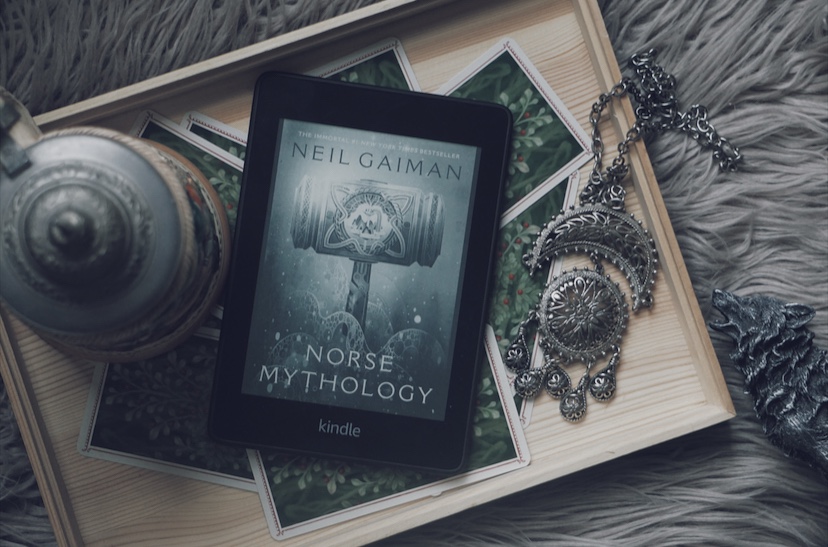
“If you fall bravely in war the Valkyries, beautiful battle-maidens who collect the souls of the noble dead, will take you and bring you to the hall known as Valhalla. He will be waiting for you in Valhalla, and there you will drink and fight and feast and battle, with Odin as your leader.”
Would it be Norsevember without reading Norse Mythology by Neil Gaiman? Absolutely not. I have always felt an affinity to mythology, and I was lucky enough to have taken a whole course dedicated to it in high school. Though I learned many mythologies over many cultures, Greek always stuck with me the most because of the general focus on it in literature. I have very much enjoyed Celtic, Norse, and other mythologies over the years, too. I love that they’re all connected. They all feel derivative of each other even though they have major differences and themes. That being said, Norse culture deserves a lot more recognition and Neil Gaiman was just the man to bring more focus to it.
“Odin has many names. He is the all-father, the lord of the slain, the gallows god. He is the god of cargoes and of prisoners. He is called Grimnir and Third. He has different names in every country (for he is worshipped in different forms and in many tongues, but it is always Odin they worship).”
Norse mythology, rightfully so, encompasses the feel of a warrior’s beliefs. Strength, courage, and cunning over all. Odin, Thor, Frey, and Freya. My favorite Norse god, though, is Loki. He provides endless entertainment. He is suave and confident. He finds a way to work his will, even if it often backfired. I have always admired wits over brute strength. Thor takes a backseat because of this. I delight in Loki’s quips and quick thinking, and Gaiman does an excellent job of making his part in mythology seem clever instead of just plain deceitful. Though Loki causes trouble, he will attempt to fix it, if only to save his own ass.
“Loki makes the world more interesting but less safe. He is the father of monsters, the author of woes, the sly god.”
This leads me to one of my favorite things about mythology; the repercussions. Mythology, in essence, is about teaching moral values and lessons. Every culture uses their stories to do this. Loki is punished for his misdeeds. Fenrir is feared because of his sheer power. Many are mistreated, sometimes wrongfully so, and other times, through a misguided attempt to stem off a worse fate. Often, this backfires. Playful Fenrir wouldn’t have become an enemy without Odin’s paranoia. Often, we are our own downfall. When society falls, as predicted throughout our mythologies, it will be because of humanity’s failings. The end of the world as we know it will be because of our mistrust of others, selfishness, our unwillingness to work through our problems with critical thinking and empathy. Every mythology focuses on rebirth, on the cycle of destruction bringing about an end and a new beginning arising from that end. Norse Mythology has a particularly unique end, a wolf that swallows the moon, the epic battle before the rebirth.
“This will be the age of cruel winds, the age of people who become as wolves, who prey upon each other, who are no better than wild beasts. Twilight will come to the world, and the places where the humans live will fall into ruins, flaming briefly, then crashing down and crumbling into ash and devastation. Then, when the few remaining people are living like animals, the sun in the sky will vanish, as if eaten by a wolf, and the moon will be taken from us too, and no one will be able to see the stars any longer. Darkness will fill the air, like ashes, like mist.”
Gaiman reminded me of why I love mythology. Our worlds are connected through stories. We relate to another person through sharing tales, trials, and triumphs. He took the basics of Norse mythology and wove an illusion, where I could imagine mountains and valleys that are made by a blow from Thor’s hammer, where Odin’s eye watches us, and we have to be on the lookout for Loki’s tricks. I adored this novel. Mythology is an interesting subject but the wrong writer can make it seem boring. Gaiman has never subjected his readers to that fate. I mean, he made Odin’s defecation and farts seem interesting. Yes, there actually is a story about this.
“No one, then or now, wanted to drink the mead that came out of Odin’s ass. But whenever you hear bad poets declaiming their bad poetry, filled with foolish similes and ugly rhymes, you will know which of the meads they have tasted.”
Happy Norsevember to all! Read this book, you won’t regret it.
Great review. I now need it!
LikeLiked by 1 person
Thanks lady!
LikeLike
That’s a great review 🌹
LikeLiked by 1 person
Thank you 🙂
LikeLike
Great review. This book is a personal favorite of mine. I remember being so excited when it came out a few years back. Gaiman delivers like no other. Keep up the great work and happy new year!
LikeLiked by 1 person
Thank you! Happy New Year! Gaiman does always deliver 🙂
LikeLike